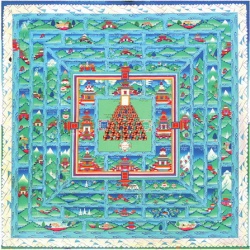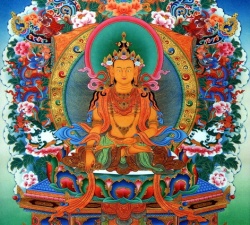Mandala Offering
So first, take the five-pointed Body posture and then visualize the Pure land, the Buddha realm, with the Divinities and Buddhas – Tapihritsa, Shenlha Ökar, whoever you could. It is similar to the way we did Refuge yesterday - you visualize them in front of you, a little above your head and hold the Mandala (in your left hand). Then rub the surface of the Mandala plate three times with the heel of your palm. The first time, you rub it anti-clockwise and visualize that all the negative actions which all the Sentient beings have done in the past are being pushed away as you rub.
Then the second time is for the future. We have seeds for future negative Karma, so the second time you rub the Mandala plate clockwise and think that these are all being pushed away.
The third time is for this Life; whatever bad things we have done, we push them away. Imagine this.
This doesn’t mean that you can push your negative Karma away! It doesn’t mean that! It just means that it is possible to purify negative Karma and so as you clean the Mandala plate, in a similar way, we can purify our own obscuration's; this shows us we can do it, it is an example to show us, and all Sentient beings. If for example something gets dirty, you can wash it, and so in a similar way, we can wash our negative Karma, because that is not Nature; negative Karma is not inherent, so therefore we can purify it. How can we purify it? (Through) Meditation, Compassion, Bodhichitta, the Nature of Mind or Emptiness: there are different methods of purifying negative thoughts or obscuration's.
When you do the Mandala Offering, imagine that you are Offering all material things – good smells, good sounds, etc – to the Three Jewels and in that way, desire is purified. That is why we do the Mandala Offering; it is a cause of Merit. That is the way to do the Mandala Offering.
How can we purify Attachment by Offering the Mandala? We imagine all our good things and imagine that we are Offering them to the Gods1. They don’t take them, it is just Thinking, but the Mind is quite powerful, so desire becomes less. Now we have very strong desire so if we try to give a gift, we think, ‘yes or no?’ It is difficult to be generous. Why? We all have Attachment and desire and so we can’t be generous to poor people and if an animal or a bird comes and we have some Food in our hands, we eat it, we don’t think that they are hungry; we eat it and don’t give it to them. That is Attachment. So, when we offer to Buddha, there is no Attachment and desire becomes weaker. That is why it is important to do the Mandala Offering.
Mandala Offering Recitation
OMe NA MA A KAR SHA YA NI SHAK SA LE SANG NI YE SO HA
(Cleaning Mandala)
DRUM RI TI GAR MA LA HO
(Put Offering grains in the center of Mandala plate)
A YANG RAM MAM Kham DRUM SHAK SA LE SANG NGE YE SOHA
(Start in front of you and put small heaps of grains in Four Directions and then in Four Intermediate Directions anti-clockwise)
CHÖ PHUR SA LE HA LO SENG
(Put four heaps of grains immediately around the center in the Four Directions)
E MA JUNG NGI TENG TU RI RAB RI DÜN DANG
LING ZHI LING THREN CHI NANG DÖ YON CHE
NYI DAI GYEN PA JE WA THRAK GYA DI
DAK GI lÖ LANG BUL LO ZHE SU SOL
On the base of the Five Elements there is Mt. Meru surrounded by seven mountain rings, sun, moon
and the Four Continents with their Sub-Continents as well as outer and inner sensual objects;
Hundreds of millions of these I imagine strongly in my Mind and offer to you!
OMe A DA DA DE DE CHÖ CHÖ SA LE HA LO SENG
(Grains brushed away from the Mandala and Blessings from the Mandala are received by the practitioner)
First of all you recite the Mantra OMe NA MA A KAR SHA YA NI SHAK SA LE SANG NI YE SO HA and rub the Mandala plate three times anticlockwise. Then, you put some rice or whatever you are Offering in the centre of the plate - usually we offer rice mixed with many different Flowers and substances – and recite the Mantra DRUM RI TI GAR MA LA HO. Then as you recite the third Mantra, A YANG RAM MAM Kham DRUM SHAK SA LE SANG NGE YE SOHA, put four handfuls of rice round the central one to represent the four Continents. In this Mantra, A means the Mandala of space; YANG means the Mandala of wind; RAM, the Mandala of Fire; MANG the Mandala of water and Kham the Mandala of earth. DRUM means your Root Lama or the Peaceful or Wrathful Deity.
Then imagine excellent sounds, rays and lights and think that you are Offering everything to Buddha and the Divinities. There are two ways; you can either put the Mandala plate on a table in front of you, or you can hold it in your (left) hand. In the Zhang Zhung Nyen Gyud tradition, we usually hold it in our hand and make a Mudra with the right hand like this, and then click our fingers. If you put it on a table in front of you, you make a Mudra with both hands and throw some rice on the Mandala as you recite the Mantra. You add a bit of rice each time you recite the Mantra. So first you fill up the first level, then the second, then the third.
The Mandala represents the World and the Four Great Continents, North, South, East and West, with Mount Meru in the center surrounded by seven mountains. Just think of all the enjoyments and pleasures of the humans and gods and that all Sentient beings are doing the Mandala Offering to the Three Jewels. If you don’t have the Mandala plate, you can just visualize everything and do the Mudra.
While you are practicing the Mandala Offering, you cannot speak to others; you must focus on your visualization of the Divinities and Buddhas.
When you have finished and done all three levels (of the Mandala plate), the visualization is similar to yesterday’s: all the Masters dissolve into your Root Guru in the center, and then he comes through the crown of your head down your Central Channel into your Heart, and that is the end.

